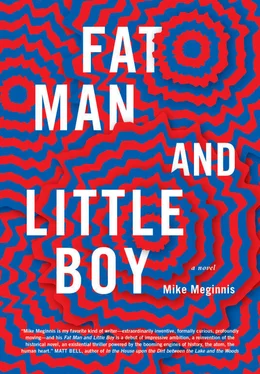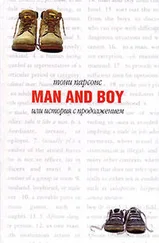“What?”
“Shoot me,” says Fat Man. “Right between the eyes. Make me look like that door.”
“If I kill you you’ll probably come back. Somewhere, some way. You’re not ready to leave yet. You’ll make a body from more Japanese. Perhaps a very ugly one.”
“Uglier than this?” says Fat Man, hefting his tits. “Uglier than this?” tugging at the mounds of his cheeks and his jowls. “And this?” holding out his arm and batting at the dough that hangs from his bones.
“You never know. You might become a brand new thing. You’ve been one before. Imagine the monster you could build for a body.”
Little Boy yawns loudly.
“If you won’t kill me, then I’ll kill you.”
“That would be okay,” says Masumi. “That would be fine.”
“Who are you?” says Fat Man. “Tell me or I’ll kill you.”
“You’re forgetting I have the gun.” She puts it to her own head, up against the ear.
Fat Man imagines the bullet going in one side and out the other unscathed, the medium grinning stupidly as it passes through her.
“Tell them your story,” says the medium, “or I’ll kill you.”
“When is your husband due home?”
“Masumi was a student,” says Masumi.
Masumi was a student.
Masumi studied English and French, with some necessary excursions into German, the three being so closely related. He was also capable of reading simple Spanish texts with the help of a dictionary.
Like most students at his school he read at least one book each day. Not simple books either. Wittgenstein, Kierkegaard, Bentham, Kant, Heidegger, Darwin, Nietzsche, and so on, all in their original languages. He kept a journal on every book he read and all the thoughts that came while he read them.
His older brother Hideki was a student as well, who focused on German and English, with some excursions to French. Because Hideki was in the next year, he and Masumi did not see each other often, and did not speak extensively. Hideki would sometimes give Masumi an envelope of the sort you might use to deliver a personal message. Inside there would be a typed partial list of books Hideki had recently read, and that Masumi must therefore read as well. There might be a brief note after the author’s name, a single word or a short phrase—“Spirit”; “Patriotism”; “Fear & Agony”; “The individual’s loneliness”; “The necessity of injustice”; “Horror”; “Need.” More often there was nothing.
Sometimes there were poems, haiku or other traditional forms, in which Hideki compared himself to the cherry blossom, the hummingbird, or the crane. There were frequent errors and unnecessary spaces in his typing. He crossed out the things he didn’t mean to write but they were still plainly visible.
Hideki was handsome. Hideki had large, broad hands and a strong face. He kept his hair cropped close to his head. He was popular and athletic. Masumi loved him and hated him as younger brothers do. He was aloof to Masumi. Masumi respected the distance he maintained.
Then there was the war. As soon as it began all the young men and the older boys knew they would die by American guns. The question was when. The emperor reminded the people of the cherry blossom. They reminded each other of the cherry blossom, and they reminded themselves.
One night Masumi went to Hideki’s room and knocked on the door very loudly. Hideki let Masumi in without question, closing his books and stacking them neatly. Masumi shouted how wonderful it would be to die in service of their country. Hideki said, “We should not have to die. We are the future of Japan. The nature of war is that it allows the fathers to wash their hands of their sons, and therefore the future.”
Masumi said it was the nature of war that it should lead to the Japanese future. Only once the Americans were humbled would history advance.
Hideki argued, with reference to Kant, that war was wrong.
Masumi said he would be proud to die for his country and become a cherry blossom.
“Even dignity,” Hideki said, “evades the strongest man in death.”
Masumi said a blazing death in war is not like a slow death in one’s bed.
Hideki agreed with this. He said, “It’s true that there are far fewer opportunities for pleasure in a gunfight. Our grandfather could still read as he was dying.”
Masumi argued reading was not the sole purpose of life, with reference to Nietzsche. Hideki interrupted him and said, “Why did you learn three languages and much of a fourth?”
“It allows me to better understand the ideas of others.”
“It doesn’t help you fire a gun?”
“It doesn’t.”
Hideki said, “Then why did you bother? You should quit the study of language and begin the study of guns. Then you can die more quickly, and therefore, more gloriously, with reference to the idiotic argument you are trying to advance.”
Masumi said he would leave the study of languages, then.
Hideki said he was a fool. He struck Masumi on his cheek. Masumi’s vision flared. Soon they were on the floor. Hideki’s knee was crushing the air from Masumi. Masumi pulled his brother’s hair. It went on like this for a long time. The fight ended when Hideki took a letter opener from his desk and pressed down Masumi’s head on the floor as if holding down a chicken for butchering. His eyes were narrow and cruel, his hand was very strong. The letter opener was textured on its surface by his fingerprints and palm prints, dots and ridges of human oils, and this made it seem heavy.
Hideki breathed in deeply. He considered the letter opener. He considered the neck of his brother, who flailed and pushed ineffectually at Hideki’s jaw and chest, trying to shove him off.
“No,” Hideki said. “I will let you do it your way.” He laid down the letter opener. He climbed off Masumi and pulled him up with both hands. Masumi never considered that he might want to kill Hideki for what he had almost done. He only loved Hideki in that moment, the hatred was gone from him, and he knew that there would be much to learn from this moment in future reflection.
He did not, however, apologize for what he’d said. Neither did Hideki.
After the fight they were cold to each other. They were not only aloof, but cruel, making themselves absent from each other’s lives whenever possible. When Masumi went home to visit their parents, Hideki refused, deciding instead to stay at school and study. He was reading the complete written works of Marx. It was, he said, more important than family.
Masumi’s father drank sake with him late into the night, and they talked of war, of when it would be Masumi’s turn to fight. Masumi did not tell his father how his brother felt because he knew that it would bring his father shame. Instead he agreed that it was good there were two sons in the family, as it increased the chances that one would survive. Masumi said, “I hope it is Hideki. He will make a good father.”
His father agreed. “You, though, might make a better husband.”
Hideki and Masumi were allowed to continue their studies for a longer time than they expected. They were being preserved, Masumi thought, because the military agreed with Hideki that the educated sons of Japan would be her future. They would be civic leaders, city planners, engineers, philosophers, and writers.
Hideki was making plans for a literary magazine. He was writing letters to a girl. No one knew her name, though some claimed to. He was, in short, beginning his life, rather than preparing to end it.
The other students behaved and thought very differently. Some took up risky behaviors, fighting with knives, espousing illicit or practically-illicit belief systems, or, in one case, beginning an affair. It was only a rumor that two boys were sleeping together but the rumor didn’t die until one left for the war, where later he did die. Others settled for cigarettes and alcohol.
Читать дальше












